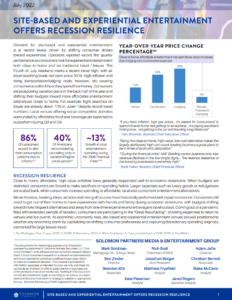 Site-Based and Experiential Entertainment Offers Recession Resilience
Site-Based and Experiential Entertainment Offers Recession Resilience
Demand for site-based and experiential entertainment is at record levels, driven by shifting consumer dollars toward experiences. Operators reported record first quarter performance as consumers look for experiential entertainment both close to home and via traditional travel / leisure. The Fourth of July weekend marks a recent travel high, with air travel reaching levels not seen since 2019. High inflation and rising transportation/lodging costs, however, are causing consumers to rethink how they spend their money. Consumers are postponing vacation plans in the back-half of the year and shifting their budgets toward more affordable entertainment alternatives closer to home. For example, flight searches on Kayak are already down 13% in June despite record travel numbers. Local venues offering social competitive activities surrounded by affordable food and beverage are expected to outperform during Q3 and Q4.
“If you have inflation, high gas prices… it’s easiest for [consumers] to spend close to home. Not getting on an airplane… not paying exorbitant hotel prices… not getting in the car and traveling long distances” – Tom Shannon, Bowlero Chief Executive Officer
“Being the close to home, high value, low-cost alternative makes the largely distributed, high unit count bowling business a great place to be in times of economic dislocation.”
“[During the financial crisis] AMF Bowling center business only saw revenue declines in the low single digits… The revenue resilience of the bowling businesses is extremely high” – Brett Parker, Bowlero Chief Financial Officer
RECESSION RESILIENCE
Close to home, affordable, high value activities have generally responded well to economic downturns. When budgets are restricted, consumers are forced to make sacrifices on spending habits. Larger expenses such as luxury goods or indulgences are scaled back, while consumers increase spending at affordable, local and convenient entertainment alternatives. Movie theatres, bowling alleys, arcades and mini golf courses have historically performed well in past recessions. Consumers still need to get out of their homes to have experiences with friends and family during economic downturns, with budgets shifting toward more frequent alternatives and away from one-time expensive and extravagant travel outlays. Coming out of a pandemic filled with extended periods of isolation, consumers are participating in the “Great Resurfacing”– showing eagerness to return to venues and live events. As economic uncertainty rises, site-based and experiential entertainment venues are well-positioned to weather any oncoming storm by capitalizing on shifting consumer preferences and capturing discretionary spending originally earmarked for large leisure travel.
Click below to read the article from the Media & Entertainment Group.
Read the Article


